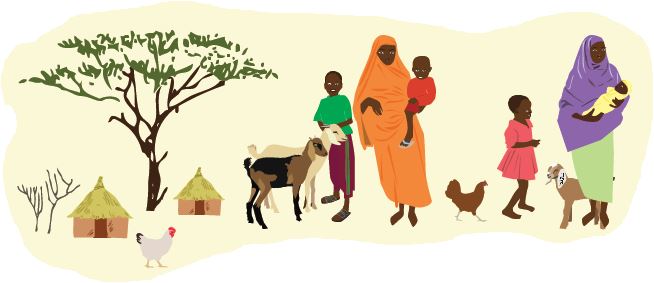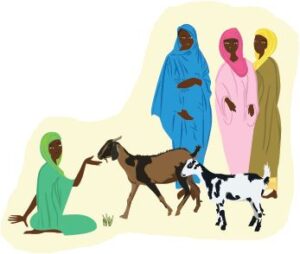
This is one of the hardest updates I have had to write in all the 23 years since my son Alastair and I first went to Darfur in 2001. We were so shocked at seeing the conditions in which children were living then that we knew we had to find a way to improve their lives with projects that would transform life long term. So many aid agencies provide help that leaves no trace. We were determined to be different. The projects we devised, by working directly with the communities, have lifted individual families out of abject poverty and helped to strengthen whole communities over the years. I could not have known how invaluable our projects would become. Despite years and years of conflict, massive inflation and turbulence, the world has continued to look away as even worse violence erupts across the entire country.
Since the overthrow of the transitional civilian Government and its hope for democracy, the subsequent violence has decimated Sudan, and nowhere worse than in Darfur. Today the regional capital of North Darfur, El Fasher itself, is under attack. Across the whole of Sudan there is a massive failure of telecommunications and internet services. The UN reports that “the complete loss of communications across Sudan hinders all efforts to coordinate the delivery of humanitarian aid, which is urgently and vitally needed by more than 25 million Sudanese”. The country is on its knees. Over 10 million people have lost everything and are homeless. The UN has said that Sudan ‘is the worst humanitarian crisis in the world today’. Children are dying right now from starvation in Darfur.
Kids for Kids is the only organisation created specifically to help the children of Sudan. For 23 years, despite continued conflict, we have been adopting village after village so that there are now 110 Kids for Kids’ villages. These villages have a chance to survive. All have committees trained to run the projects, to repair our water handpumps, to ensure the goat loans pass on from family to family – more and more children benefitting from their milk. The revolving veterinary drug schemes have meant that veterinary drugs have been available in even the most remote communities. I have had many reports over the years of the reduction in cases of malaria because we have provided many thousands of mosquito nets. Even now, the tens of thousands of seedlings we have planted continue to flourish, providing a future that will be more resistant to climate change and cycles of drought.
In Darfur, the Commissioner for the Humanitarian Aid Commission, who authorizes and oversees all international and national aid agencies, told me that we are unique in providing a Manual detailing all our projects, which we agree with each community as a contract between beneficiaries and ourselves on the standards that must be met. He said he wished all organisations were equally transparent and committed to real sustainability.
As I write, it is too dangerous to deliver the emergency aid we have stored in warehouses in El Fasher. Because of the conflict there, those who normally do so much from the regional capital to support villages have had to flee with their families to the relative safety of our rural villages. We cannot put anyone in danger, however much aid is needed, but we are ready to move as soon as it is possible to do so. Our Darfurian volunteers are exceptional people, as is our dedicated Programme Manager, Hassan Mehesi.
I am so grateful to everyone who has been helping us to build an Emergency Fund for the Greatest Need. That means we will be able to act fast as soon as conditions permit, and to ensure the future for children whose families are now struggling to feed them, and we must be able to adopt as many villages as possible as soon as there is sufficient calm. We remain committed to helping people in Darfur for the long term.
Today our projects are beyond value to families in such desperate need. Healthcare has collapsed across the country – yet expectant mothers know that the Kids for Kids’ midwives and first aid workers are there for them. When animals fall sick, our paravets are in every one of our villages. Our handpumps have been working day and night providing clean fresh water. With inflation so out of control, people cannot afford the basics and are desperate for food. Anything else is impossible for anyone to consider. Giving a family mosquito nets and blankets for their children is now a dream for mothers. Replacing a water jerry can when it cracks is impossible. One mother was lent one by a neighbour when hers was broken beyond repair. It takes her four hours to collect just one jerry can of water from the distant handpump. She has three children. She has no money to replace her jerry can. When she returns home, she gives half of the water she has carried to her neighbour.
There is! I could not believe my eyes when I was sent a video, before the internet shut down, made on an old mobile phone in Azagarfa, a village we adopted in 2004. The village has one of our 14 Kindergartens – theirs was sponsored by the children at the City of London school. Elsewhere schools have closed across Sudan and millions of children have had no education since last April. The video from Azagarfa village shows children coming out of our Kindergarten singing to celebrate Independence Day – singing as children across the world love to do, even in the middle of such terrible violence. These children are our children. These children and many more like them are the children you continue to help us support.
Let us work together and see how many more children we can help to go to school, and to sing in safety.
Thank you so very much for your continued support. Please read how to become a Children’s Champions. It would be very special if you can help in this way. At this, the bleakest time in Sudan, you are each a ray of sunshine, penetrating the darkness and giving hope to those whom the rest of the world has forgotten. 

Patricia Parker OBE – Founder, CEO & Chairman of Trustees.
2024 Spring Mailing Documents (all in one place!):

Registered Charity No: 1100045. A Company limited by Guarantee Registered in England & Wales No: 04607292. Recognised by the Humanitarian Aid Commission in The Sudan as a Charitable Foundation.
Copyright Kids For Kids © 1990 – 2021 US Friends of Kids for Kids Registered with Global Giving 501(c)3 Supported by HolmPC Ltd.